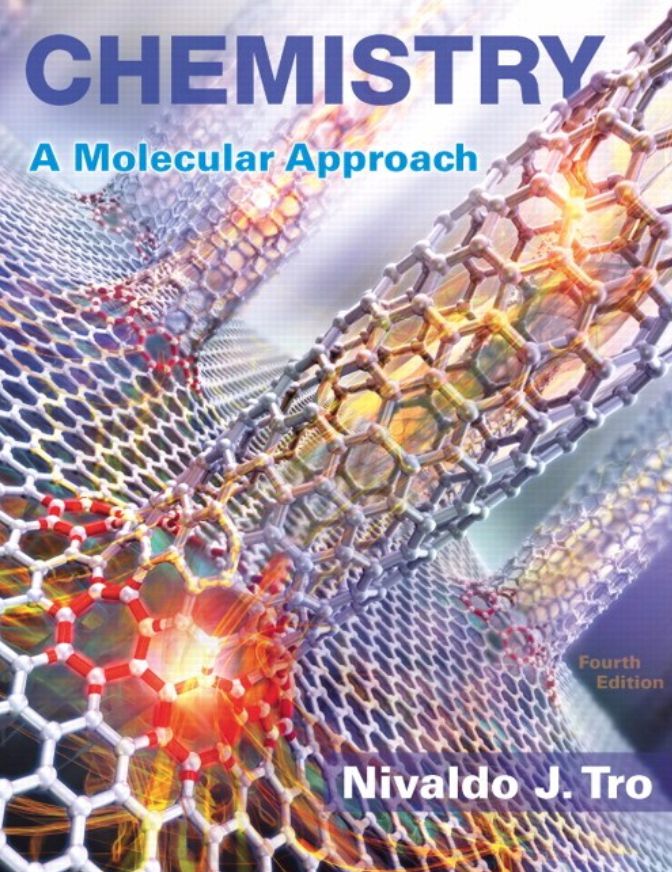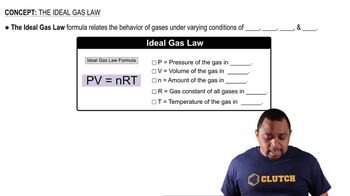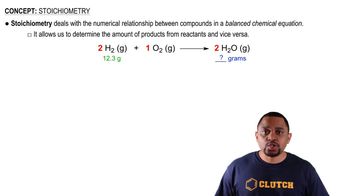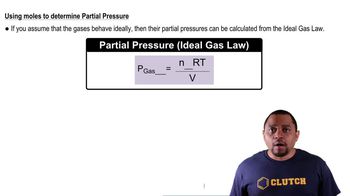A catalytic converter in an automobile uses a palladium or platinum catalyst (a substance that increases the rate of a reaction without being consumed by the reaction) to convert carbon monoxide gas to carbon dioxide according to the reaction: 2 CO(g) + O2(g) → 2 CO2(g) A chemist researching the effectiveness of a new catalyst combines a 2.0:1.0 mole ratio mixture of carbon monoxide and oxygen gas (respectively) over the catalyst in a 2.45-L flask at a total pressure of 745 torr and a temperature of 552 °C. When the reaction is complete, the pressure in the flask has dropped to 552 torr. What percentage of the carbon monoxide was converted to carbon dioxide?
Ch.5 - Gases

Chapter 5, Problem 119
A mixture of CO(g) and O2(g) in a 1.0-L container at 1.0×103 K has a total pressure of 2.2 atm. After some time, the total pressure falls to 1.9 atm as the result of the formation of CO2. Determine the mass (in grams) of CO2 that forms.
 Verified step by step guidance
Verified step by step guidance1
Identify the initial and final conditions of the system: The initial total pressure is 2.2 atm, and the final total pressure is 1.9 atm.
Determine the change in pressure due to the formation of CO2: Subtract the final pressure from the initial pressure to find the pressure change.
Use the ideal gas law to relate the change in pressure to the change in moles of gas: \( \Delta P = \Delta n \frac{RT}{V} \), where \( R \) is the ideal gas constant, \( T \) is the temperature, and \( V \) is the volume.
Calculate the change in moles of gas (\( \Delta n \)) using the pressure change and the ideal gas law equation.
Convert the change in moles of CO2 to mass using the molar mass of CO2 (44.01 g/mol).

Verified video answer for a similar problem:
This video solution was recommended by our tutors as helpful for the problem above.
Video duration:
10mWas this helpful?
Key Concepts
Here are the essential concepts you must grasp in order to answer the question correctly.
Ideal Gas Law
The Ideal Gas Law relates the pressure, volume, temperature, and number of moles of a gas through the equation PV = nRT. In this scenario, understanding how changes in pressure and temperature affect the number of moles of gas is crucial for determining the amount of CO2 produced from the reaction.
Recommended video:
Guided course

Ideal Gas Law Formula
Stoichiometry
Stoichiometry involves the calculation of reactants and products in chemical reactions based on balanced equations. In this case, knowing the stoichiometric relationships between CO, O2, and CO2 will help determine how much CO2 is formed as the reaction proceeds and the pressure changes.
Recommended video:
Guided course

Stoichiometry Concept
Partial Pressure
Partial pressure is the pressure exerted by a single component of a gas mixture. According to Dalton's Law, the total pressure of a gas mixture is the sum of the partial pressures of its components. Understanding how the total pressure changes as CO2 forms will allow for the calculation of the amount of CO2 produced.
Recommended video:
Guided course

Partial Pressure Calculation
Related Practice
Textbook Question
1
views
Textbook Question
A quantity of N2 occupies a volume of 1.0 L at 300 K and 1.0 atm. The gas expands to a volume of 3.0 L as the result of a change in both temperature and pressure. Find the density of the gas at these new conditions.
Textbook Question
The radius of a xenon atom is 1.3×10– 8 cm. A 100-mL flask is filled with Xe at a pressure of 1.0 atm and a temperature of 273 K. Calculate the fraction of the volume that is occupied by Xe atoms. (Hint: The atoms are spheres.)
2
views
Textbook Question
A mixture of 8.0 g CH4 and 8.0 g Xe is placed in a container and the total pressure is found to be 0.44 atm. Determine the partial pressure of CH4.
